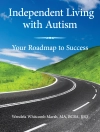New to Autism?
While the world is slowly becoming a friendlier place for neurodivergent people, a diagnosis can be overwhelming. Sometimes it would be nice to just flip through a book and find the answers to the challenges, questions and opportunities that arise.
That’s why ‘Autism: The Big Book Set of Help!’ series was written – and written by an autistic person.
It is focused on giving you clear and direct help you can access as you need, and help understanding from inside a neurodivergent brain.
Book one, in this series of five, will get you started on your journey.
If you are curious to understand more about Autism, this is an introduction to our world, culture, and linguistics.
Here, you will learn about IFL (Identity First Language), clear and direct communication, the pros and cons of getting an official diagnosis and much more.
It’s suitable for all. Whether you’re a parent, clinician, or therapist, or discovering your own neurodiversity.
If you know or love an Autistic person, or if you are an amazing Autistic yourself, then the best way to offer support is to try to understand the world through our eyes.
That’s what the ‘Autism: Big Book Set of Help!’ is here for.
Heather Mc Kay (she/ her, they/them) is an Autistic single mother of two, who holds degrees in Business and Education from RMIT, Cornell, and Monash Universities.
A company director and inventor of products for diverse needs, and a self-advocate for autistic and neurodivergent rights.
For more information about her company and emerging products visit www.mckayandmckay.com
Daftar Isi
Acknowledgements
Foreword
The layout of these books
What will you learn from these books?
About me and these books
Disclaimer
The problem with Autism
Terms
What is Autism?
Spiky Profile
Differences in Neurotype Communication
Identifying Autism
BAP – Broader Autism Phenotype
Severity of Autism
Myths about Autism
Autism and Medication
Making Friends
Autistic Community
Difference between NT led parenting groups and autistic led parenting groups
Figuring out if you or a loved one might be autistic
What to do next
Diagnosis
ASD Assessments
Reasons why a diagnosis is denied
Misdiagnosis
During the Assessment
Assessment timing
Outcomes of Diagnoses
Self-Diagnosis
Reasons for seeking a diagnosis
Hindrances to diagnoses
What to do after Diagnosis
Next Steps
Schools and Diagnoses
School Diagnosis and Advocacy
Therapists and Diagnoses
Ableism
Minorities within Minorities
Where to now
References
Books












